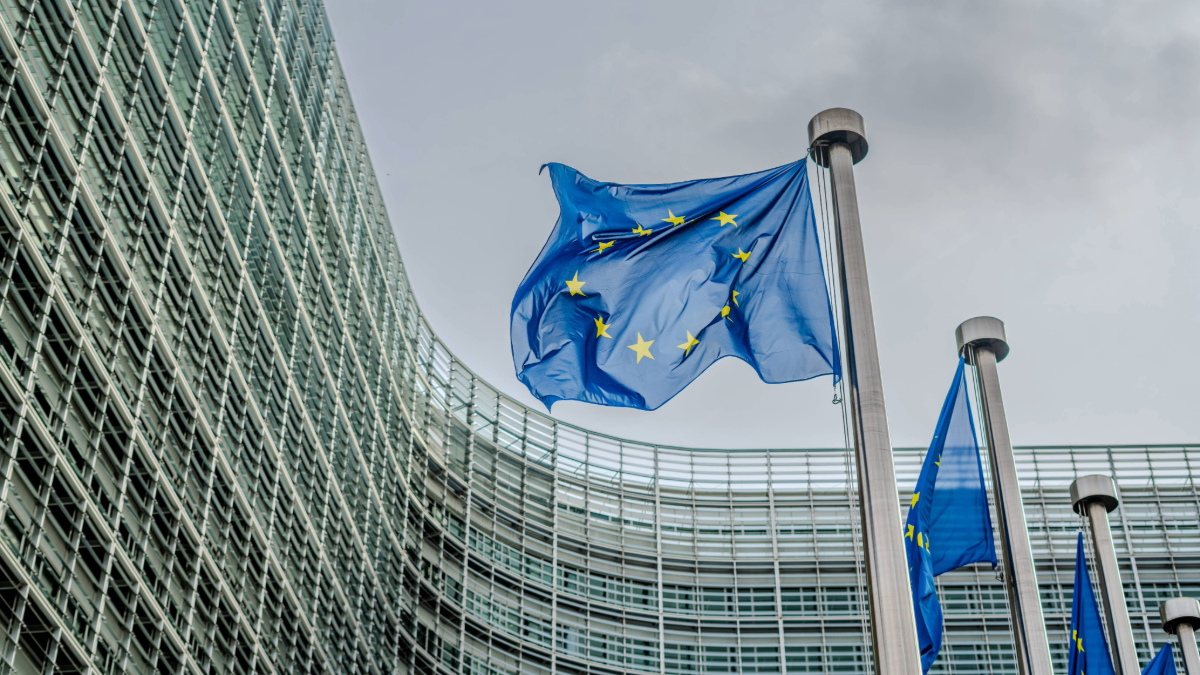Europe’s Digital Sovereignty is a Democratic Imperative
Jonah Schwope / May 14, 2025As artificial intelligence becomes central to global power competition, Europe finds itself at a crossroads. The question is no longer whether AI will reshape our economies, infrastructures, and democracies—it already is. The real question is: Will Europe shape this transformation (globally) or be shaped by it?
Across the Atlantic and in Beijing, AI is not merely a tool for innovation, but a means of shaping societal structures and exerting (geo)political power. The US champions deregulated, profit-first expansion. China relies on state-driven control. Neither aligns with democratic principles. Most worryingly, a new political-technological complex is emerging in the US—an alliance between right-wing actors and dominant tech platforms—that threatens democratic institutions through deregulation, disinformation, and attacks on oversight itself. This is not just about technology; it’s about overthrowing the modern administrative state, the erosion of the rule of law, and the fragmentation of truth.
For years, Germany—Europe’s largest economy—has set the tone on EU market policy. But when it comes to digital governance, it has often hesitated. Now, with a new coalition government in Berlin promising that “digitalisation and government modernisation are a top priority,” the time has come to lead. If Germany believes in liberal democracy, it must stop playing defence and become an architect of digital sovereignty.
Therefore, it must understand what’s at stake. Digital sovereignty isn’t only about competitiveness—it’s about democratic survival in an age of algorithmic governance. The recent AI Action Summit hinted at this shift, but the debate remains fragmented. Innovation policy, democratic resilience, and market strategy are still treated as separate silos. That’s a strategic mistake.
While the EU has already taken bold regulatory steps: the AI Act, the Digital Markets Act, and national investments like France’s €109 billion AI plan or Germany’s 500 billion special infrastructure fund (a substantial part of which is expected to support digital modernisation) all signalling ambition, its double aim—to both regulate the market and win in it—is becoming harder to sustain. Critics warn that overly prescriptive rules may stifle homegrown innovation and deepen reliance on US tech giants, whose scale and political backing outmatch Europe’s regulatory influence.
Meanwhile, China and the US aggressively push their models, using economic and geopolitical leverage to expand their digital dominance. But does that mean Europe should budge? No, if adapted wisely, its regulatory-first model can become a unique strategic advantage. Ethical standards, trust-by-design, and enforceable norms can distinguish European tech globally.
This is not about choosing between ethics and progress—it’s about showing that both can go hand in hand. Clear rules can build trustworthy products, protect citizens, and foster democratic and economic innovation. The real question is not whether to regulate, but how to evolve our regulatory model into a platform for competitiveness, making the right investments and governance reforms. So what options should be on the table?
1. Building European Tech Champions
Strengthening domestic players can boost innovation, reduce reliance on foreign platforms, and support Europe’s economic sovereignty. Initiatives like the EU AI Champions Initiative and calls for strengthening InvestEU’s fund to €50 billion are promising. Still, Europe faces real challenges: limited venture capital, late market entry, and dominant incumbents already perceived as “natural monopolies.” Supporting challengers without distorting competition will require careful policy design.
Yet we must acknowledge that software follows a unique logic—unlike other sectors such as automotive, it operates in winner-takes-all dynamics. Supporting "a bit of everything" is a dead-end. Being 2nd or 3rd is no attractive option in the digital economy; accordingly, we need to invest in our known strengths instead of giving out money like a watering can. Moreover, SAP’s recent decision to abandon diversity standards in response to Trump-era politics highlights that blindly trusting the democratic values of European companies is misguided — without enforceable standards and accountability, betting on European companies does little to strengthen democracy.
2. Antitrust Enforcement & Strategic Acquisitions
Recent EU fines—€500 million on Apple and €200 million on Meta—show a commitment to enforcing the Digital Markets Act. More decisive antitrust action could help dismantle entrenched monopolies and stimulate fairer competition. But enforcement under the Von der Leyen Commission remains cautious and often shaped by broader geopolitical considerations (e.g., Ukraine). Without more decisive follow-through, fines alone may do little to change market dynamics.
More radical voices propose public buyouts, such as MEP Sergey Lagodinsky’s call to purchase TikTok, to assert digital sovereignty. This would offer leverage over data protection and platform governance. Yet the legal, financial, and political hurdles are significant. Still, such proposals force Europe to confront the limits of regulation without ownership, and to explore creative tools for platform influence.
3. Digital Infrastructure: Between Visionary Futures and Present-Day Beginnings
Digital services increasingly resemble essential infrastructure. Treating them as public utilities—subject to democratic oversight—could promote equitable access and prevent dangerous concentrations of power. Dr. Joanna Bryson notes that utilities could possibly remain “too big” as long as they’re accountable to the public. But applying such a regulatory model to global, borderless tech services would require major transnational legal and institutional innovations—ambitious, but potentially transformative. Accordingly, this is rather a long-term vision.
Most promising for the mid-term is economist Francesca Bria’s ‘Eurostack’ concept, proposing a unified digital infrastructure grounded in European values across AI, cloud, semiconductors, and cybersecurity. This vision could harmonize standards, boost resilience, and deliver economies of scale. But realizing it will require more than abstract ambition. Figures like Federal CIO Markus Richter and industry leaders such as Deutsche Telekom’s CEO are already calling for cloud infrastructure and sovereign AI investment.
Yet, Germany and the EU still lack both a clear strategic roadmap and the political mechanisms to build credible digital infrastructure. Fragmentation and risk aversion cultures, particularly within public procurement, are among Europe’s biggest obstacles. Moreover, public funds have too often been invested in development, only for ministries to later buy foreign tools. For instance, initiatives like Gaia-X have never made it beyond the concept stage. This signals a lack of strategic coherence.
To overcome these challenges, three measures are crucial:
- Public procurement reform: The state must act as an anchor client for emerging European tech solutions, even if that means accepting greater risk. Procurement needs to be designed specifically for software and placed in the hands of agencies that understand both the technical and strategic stakes. And it must reform its communicative approach to reach those who are truly innovative, not just those best at writing grant applications. While progressives in the UK have already begun critically assessing the need for public procurement reform in response to the challenges and opportunities presented by AI, the debate in Germany is only now gaining momentum.
- Open-source investment: Every euro invested in open-source infrastructure returns multiplied public value. Building shared libraries and platforms could accelerate sovereign development and reduce vendor lock-in. Yet, current licensing and legal frameworks complicate open approaches and need urgent modernization. At least in Germany, the government created a legal basis with the adoption of the amendment to the law on the preferential use of open source software (Section 16a of the E-Government Act - EGovG). Now, clearly defined and ambitious targets, a straightforward roadmap, and sufficient funding are needed to sustainably increase the proportion of open source software use in government to further Germany's digital sovereignty.
- Governance coordination: Fragmentation across ministries, regions, and EU institutions must be addressed. A whole-of-government approach is essential, like the one outlined in Germany’s coalition agreement. Digital sovereignty cannot be the responsibility of any single ministry; it must be embedded across policy, procurement, and industrial strategy. It is crucial that coordination efforts now move beyond rhetoric and are supported by concrete actions and sustained collaboration across all relevant stakeholders. Establishing a unified network platform for collaboration and knowledge sharing could be a first important step.
Finally, the conversation around the Eurostack must evolve beyond abstract sovereignty rhetoric. As AI becomes integral to public infrastructure, market dynamics, and democratic processes, siloed discussions are no longer sufficient. What’s needed is a coherent and actionable vision of “digital sovereignty”—one that responds to economic competitiveness and the democratic imperative of maintaining control over the digital systems shaping our societies. As recently argued, a “European Way” that harmonizes innovation, competitiveness, and democratic values requires the EU to move beyond reactive regulation and fragmented initiatives. Instead, it must adopt a unified, principle-driven approach that fully leverages its collective strengths.
Yet it is important that this approach goes beyond protecting European industry from international pressures; it must be guided by a commitment to a) protect our democratic governance structures against hostile actors, and b) get democratic structures into action to bolster technological development that serves the public good. Accordingly, Germany’s new digital Minister Karsten Wildberger's priority will be to prove how AI can modernize both the state and economy—democratically, transparently, and effectively — because if Germany can’t do it, why should anyone else believe in Europe’s vision?
There are many visionary approaches to learn from: overseas, Taiwan’s participatory AI platforms, in Europe: Helsinki’s and Amsterdam’s AI-enhanced public service approaches, or local initiatives in Germany, such as Schleswig-Holstein’s sovereign cloud—all demonstrate how public benefit and regulatory vision can align. A tailored governance approach for such a development path can, in accordance with IPPR scholars Jung and Desican, be coined as AI “directionism,” governance that focuses not just on acceleration, but on steering technology toward democratic outcomes. Accordingly, we need an operational vision for the next ten years—led by public-private collaboration, funded at scale, and guided by a governance model that privileges democratic resilience over convenience or short-term market fit.
What must be clear, especially for the new coalition government of Germany’s centre-right Union parties (CDU/CSU) and the centre-left Social Democratic Party (SPD), is that a regulatory-first approach, far from being a liability, can offer a critical strategic advantage: ‘Trust-by-design’ entails not only building governance frameworks that ensure technology is trustworthy by design—it is also about restoring public trust in the state’s ability to navigate challenges, crises, and transformations through effective, democratic governance.
With Germany’s new coalition government, an opportunity exists to build bridges across European member states and between conservatives and progressives. Europe has the regulatory tools, the economic clout, and the democratic compass to lead. While France has signalled its willingness to act, it is now up to Germany to step up and once again put the European engine in motion.
Authors

